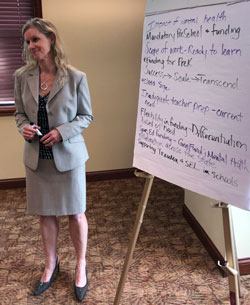School superintendents from Kent, Ottawa and Muskegon counties gave their state legislators an earful about how state funding cuts have impacted students during a meeting on Monday, June 24.
Chris Glass, director of legislative affairs for the West Michigan Talent Triangle, said they wanted to give the legislators a “boots on the ground” perspective on how education has suffered. Michigan has fallen far behind other states in achievement scores and funding levels, the school superintendents and teachers told the legislators who were seated among them at round tables.
“We’re not where we need to be on student performance,” Glass told about a dozen state legislators and their top aides during a luncheon session hosted by Kent ISD.
The educators also offered a solution developed by the School Finance Research Collaborative, which tracked school funding trends in Michigan and made comparisons with other state education funding programs.

New Funding Formula Sought
Instead of Michigan’s one-size-fits-all funding formula based on each district’s student population, the study urged Michigan to change its school funding formula so it is weighted on the basis of each student’s learning needs. That means additional funding for districts that rely more heavily on English Language Learning programs, special education and have greater numbers of students in poverty.
The study recommended that the base funding in Michigan rise to $9,590 a year, not including transportation, meals, and other costs. Michigan schools currently receive $8,188 per student in base funding.
Adjusted for inflation, Michigan schools get only 82 percent of the funding they received in 1995, when Proposal A shifted school funding formulas from local sources to the state. Funding for at-risk students has fallen 60 percent from 2001 to 2017, according to the study.
Michigan now ranks among the worst states in the funding gap between school districts with the most students in poverty and those with the fewest students in poverty. “We think the poor are getting poorer and the rich are getting richer,” said Kent ISD Assistant Superintendent Ron Koehler, a member of the School Finance Research Collaborative’s steering committee.
Legislators Respond
For their part, the legislators were sympathetic but also had suggestions.
State Rep. Julie Calley, R-Portland, said she has three children in public schools. “How do we deal with all of the factors that have entered the classroom? We’re expecting our teachers to be parents to the kids and parents to the parents.”
Citing golfer Tiger Woods’ early training in golf, State Rep. Tommy Brann, R-Wyoming, said he liked the idea of mandatory full-time pre-school and kindergarten as a way to prepare students for achievement.
State Rep. Pamela Hornberger, chair of the House Education Committee and a former teacher, drove to the conference from her district in Macomb County to participate in the discussion. She said funding increases for education would not be automatic and needed bi-partisan support.
State Rep. Greg VanWoerkem, R-Norton Shores, said the reforms being proposed may require structural changes in the way education is funded to overcome the constitutional restrictions currently in place. “There’s got to be a total reform if you want to get the type of dollars you’re looking for and that’s going to be difficult because of term limits.”












